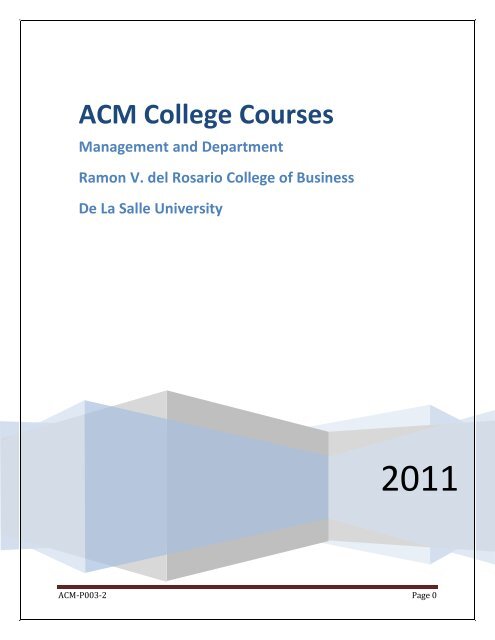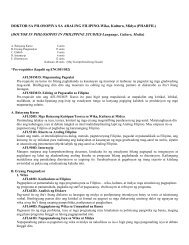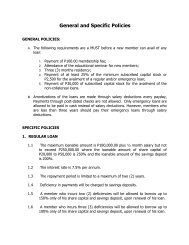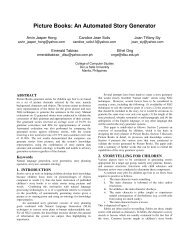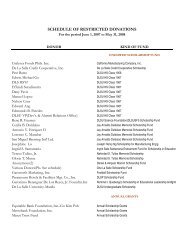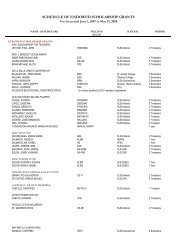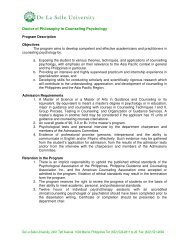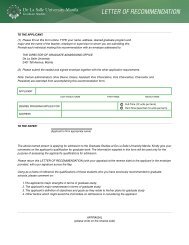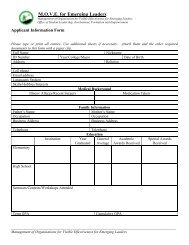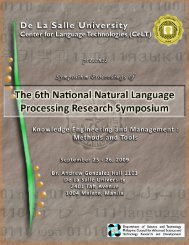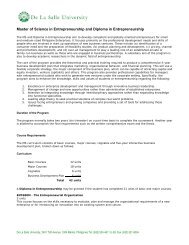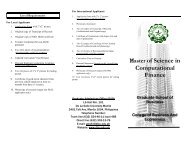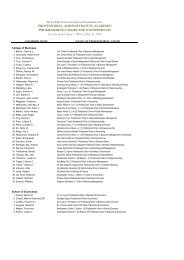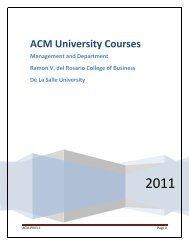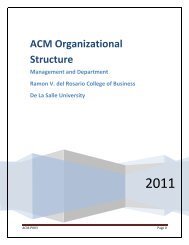ACM College Courses - De La Salle University
ACM College Courses - De La Salle University
ACM College Courses - De La Salle University
Create successful ePaper yourself
Turn your PDF publications into a flip-book with our unique Google optimized e-Paper software.
<strong>ACM</strong> <strong>College</strong> <strong>Courses</strong>Management and <strong>De</strong>partmentRamon V. del Rosario <strong>College</strong> of Business<strong>De</strong> <strong>La</strong> <strong>Salle</strong> <strong>University</strong>2011<strong>ACM</strong>-P003-2 Page 0
1.0 COURSE OVERVIEW1.1 Accounting. Every <strong>ACM</strong> student enrolls in 12 units of accounting. These areBasic Accounting Part I and II, Accounting for Partnership and Corporation, andManagement Accounting1.2 Mathematics. Included in the curriculum of <strong>ACM</strong> students are an additional 12units of mathematics. These are algebra, business mathematics, business calculusas well 6 units of statistics.1.3 Marketing. Unlike other non-marketing business students, <strong>ACM</strong> students arerequired to take 9 units of marketing. This covers basic marketing, salesmanship,and product management.1.4 Computer Applications. There are two courses in computer applications. Thefirst is a basic computer course while the second is targeting to provide expertlevel competency in Microsoft word, excel, and powerpoint.1.5 Economics. Students of <strong>ACM</strong> take 9 units of economics. These are microeconomics,macro-economics, as well as contemporary national and economicdevelopment.1.6 Finance. <strong>ACM</strong> students also take 6 units of finance.1.7 <strong>La</strong>w. There are 12 units of law covering Obligations and Contracts, Partnershipsand Corporations, Business and Income Taxation as well as Sales, Agency, andBailments.1.8 Management Science. This is a 3-unit course that teaches students how to usequantitative techniques in finding solutions for business problems.1.9 Operations Management. Another 3-unit course that introduces students to theproduction/operations side of business, where quality and efficiency are critical.2.0 LEARNING OUTCOME2.1 Accounting. Students are expected to get basic knowledge of accounting. Theywill be able to differentiate the accounting procedures used by the different typesof business organization. They will be able to prepare financial statements andinterpret accounting information.<strong>ACM</strong>-P003-2 Page 1
2.2 Mathematics, Students are able to use mathematical tools and techniques inaddressing everyday problems. The subjects offered under this category is meantto enhance the technical skills of students.2.3 Marketing. Subjects under this group are aimed to develop practical selling andmarketing skills of students. They will learn both the science and art ofmarketing.2.4 Computer Applications. This is practical course that enhances the computer skillsof students. Students should be able to gain expert level competence in Microsoftproductivity software.2.5 Economics. Students will develop their skill to understand and apply economictheory to real world problems that are faced within the corporate environment.2.6 Finance. The 6-units provides technical skills in the interpretation, analysis, andevaluation of firm performance using various ratios and techniques. It providesan understanding how to manage finances in organization. Lessons move intoinvestment, capital budgeting, and debt management.2.7 <strong>La</strong>w. The 12 units of law are meant to prepare students with the legal aspects ofbusiness. The courses aim to develop among its students better understanding ofthe legal framework against which business decisions are made. It also equipsstudents with knowledge, information and skills that will help them cope with thecomplex legal frameworks that affect today’s business environment.2.8 Management Science. Students should be able to determine and utizlie theappropriate quantitative tool to address a business issue.2.9 Operations Management. This course is meant to improve the technicalcompetence of students in the area of operations.3.0 COURSE COVERAGE3.1 Accounting3.1.1 Introductory Accounting Part 1 (ACTBAS1). This introductory course isdesigned to develop a basic understanding of the conceptual frameworkunderlying the measurement and communication of financial data forbusiness decisions as well as their relevance in the national context. Thiscourse deals with analyzing, recording and processing businesstransactions commonly engaged by a sole proprietor of a serviceenterprise. The fundamental concepts and principles essential to the<strong>ACM</strong>-P003-2 Page 2
measurement and communication of said transactions are introduced andemphasized as the course progressesPrerequisite: NonePrerequisite to: ACTBAS23.1.2 Introductory Accounting Part 2 (ACTBAS2). This course deals with theaccounting cycle for a sole proprietorship form of business engaged inmerchandising activities. It includes recording of business transactionsinvolving merchandising business, property, plant, and equipment, andpreparation of financial statements for business decision-making. Thecourse is designed to respond to changes brought about by developmentsin information technology through the use of a computerized accountingsystem. Accounting topics on the voucher system, petty cash fund, andbank reconciliation statement are also included.Prerequisite: ACTBAS1Prerequisite to: ACTPACO, ACTMANA, FINMAN13.1.3 Partnership and Corporation Accounting (ACTPACO). This course dealswith transactions, financial statements, and problems peculiar to theoperations of partnership and corporations as distinguished from soleproprietorships. Special topics on book value per share and earnings pershare are included.Prerequisite: ACTBAS2Prerequisite to: None3.1.4 Management Accounting (ACTMANA). ACTMANA is a basic coursethat combines the knowledge of management practice and makes use ofaccounting information for decision-making. It introduces a paradigmshift from preparation of financial statements to actual relevant usage inday-today management activities. The course exposes students to thepreparation of internal reports tailor-fitted for management decisionmaking. The planning and controlling of management activities areemphasized through accounting and mathematical techniques that willallow for informed judgment.Prerequisite: ACTBAS2Prerequisite to: None<strong>ACM</strong>-P003-2 Page 3
3.2 Mathematics3.2.1 Business Mathematics (BUSMATH). It is a course that placesmathematics in the context of businessPrerequisite: COMALGEPrerequisite to: CBESTA1, BUSCALC3.2.2 Business Calculus (BUSCALC). An introduction to the fundamentals ofmathematical analysis, emphasizing analytic geometry and calculus withapplication in business and economics.Prerequisite: BUSMATHPrerequisite to: MANASCI3.2.3 Statistics 1 (CBESTA1). A study involving descriptive statistics. Itsprincipal objective is to enable the student to be familiar with the differentaspects of a statistical research and then to apply the descriptive statisticalmeasures in actual situation. The basic topics such as concepts and rules ofprobability are applied to problem solving in business.Prerequisite: BUSMATHPrerequisite to: CBESTA2, MANASCI, MANARES3.2.4 Statistics 2 (CBESTA2). Its main objective is to enable the student toapply the statistical methods and techniques to small-scalebusiness/corporate management situations. At the end of the course, thestudent is expected to analyze and solve statistical problems, interpretstatistical results and then to realize the significance of statistics inbusiness decision - making.3.3 MarketingPrerequisite: CBESTA1Prerequisite to: None3.3.1 Principles of Marketing (MARKET1). This course covers the Principlesand Basic Concepts of Marketing. Primary emphasis is made on the fourbasic elements of Marketing (the Marketing Mix) - Product, Price,Placement, and Promotion. The concepts as well as its application inPhilippine industry and market are discussed. Students are encouraged to<strong>ACM</strong>-P003-2 Page 4
prepare a simple marketing program and develop a hypothetical productfor presentation at the end of the term as a result of all the class lessons.Prerequisite: BUSORGAPrerequisite to: MARKET2, PRC<strong>ACM</strong>1, STRAMAN3.3.2 Salesmanship and Sales Management (MARKET2). The courseintroduces the business student to the concept of Selling and SalesManagement. Of all the different departments in a business, it is only thesales department that is specifically established to generate revenuethrough the products and services of the organization. The student is givena proper appreciation of the Sales function, introduced to the conceptsbehind effective selling technique, and an overview of the SalesManagement function as it relates to the entire organization. Part of thesubject is the Learning By Doing Program where the students are requiredto sell from a selection of product from various companies which areaccredited by a committee composed of faculty and students. A quotarepresenting 25% of the final grade is given so that the students have asales target to aspire for. The actual selling function is replicated as thepractice of submitting sales reports and being part of a sales team isreplicated in class.Prerequisite: MARKET1Prerequisite to: MARKET3, PRC<strong>ACM</strong>23.3.3 Product Marketing (MARKET3). A course on product planning anddevelopment. The study covers all functions involved in the formulationof product policies and the development of a marketing plan. The planincludes the elements of product and product design, principles andtechniques of branding, labeling, standardization, quality control,introduction of new products, modification or elimination of old ones. Italso covers the strategies for pricing, advertising, sales promotion,distribution, publicity, and social responsibility. This subject serves asthe integrating course for Marketing Management majors.Prerequisite: MARKET2Prerequisite to: PRC<strong>ACM</strong>3<strong>ACM</strong>-P003-2 Page 5
3.4 Computer Applications3.4.1 Computer Applications 1 (LBYBUS1). This is a course for businessmanagement students to introduce the basic computer concepts. Thiscourse is designed to provide students with a broad understanding ofinformation technology and its importance to business environment.Prerequisite: NonePrerequisite to: LBYBUS13.4.2 Computer Applications 2 (LBYBUS2). This is an advanced computercourse for students to gain expert level competence of microsfot word,excel and powerpoint.3.5 EconomicsPrerequisite: LBYBUS1Prerequisite to: PRC<strong>ACM</strong>1* (forthcoming)3.5.1 Basic Microeconomics (ECONONE). The course introduces students tobasic microeconomics. It focuses on individual decision-making units likethe consumer and suppliers. It is also deals with trends that affectparticular business firms, workers, or regions in the economy.Prerequisite: COMALGEPrerequisite to: ECONTWO3.5.2 Introduction to Macroeconomics (ECONTWO). This course is anintroduction to macroeconomics, which will provide students withsufficient understanding of the definition and determinants of aggregatevariables in the economy. After a quick review of the fundamentalprinciples of economic analysis, including graphing and theoreticalconcepts, the rest of the term will focus on learning the tools ofmacroeconomics, exploring the role of fiscal policy in stabilizing theeconomy, and studying functions of money and how it can be used as apolicy tool in achieving a country’s macroeconomic goals. Armed withthe basics, the succeeding sessions will be devoted to deeper discussionsof issues involving unemployment and inflation, government budgetdeficits, exchange rates, the open economy and other current policyconcerns.<strong>ACM</strong>-P003-2 Page 6
Prerequisite: ECONONEPrerequisite to: CONADEV3.5.3 Contemporary National and Economic <strong>De</strong>velopment (CONADEV). Thiscourse is designed as an introduction to the multidimensional aspects ofthe development process and the practical problems or issues involved inboosting the rate of economic growth in low-income countries. The courseprovides a thorough discussion of economic growth models as well as acritical analysis of these models in the context of developing countryexperience. An in-depth analysis of critical socio-economic issues willalso be consistently conducted in order to foster critical thinking, generatemore pragmatic insights and instill much needed awareness about thedevelopment process in LCDs as well as its social, economic and moralimplications. Reference to Philippine development experience will bemade throughout the duration of the course.3.6 FinancePrerequisite: ECONTWOPrerequisite to: None3.6.1 Financial Management 1 (FINMAN1). This is a basic course in FinancialManagement. It provides students with the basic principles, techniquesand analytical tools needed in conducting financial analysis, in evaluatingand forecasting a business firm’s financial performance and in managingworking capital, with focus on cash, marketable securities, accountsreceivable, inventories and short tem financing sources.Prerequisite: ACTBAS2Prerequisite to: FINMAN23.6.2 Financial Management 2 (FINMAN2). The course is a continuation ofFinancial Management 1. It covers the more complex aspects of financialdecisions such as medium to long term investments, capital budgetingunder uncertainty, debt versus equity financing, cost of capital, dividenddecisions, valuation, and stock options/warrants These concepts areapplied to financial and non-financial enterprises.Prerequisite: FINMAN1Prerequisite to: STRAMAN<strong>ACM</strong>-P003-2 Page 7
3.7 <strong>La</strong>w3.7.1 Obligations and Contract (OBLICON). Provides an understanding of thebasic concepts and principles of law in general. A student learns his/herrights and obligations in relation to acts and omissions, thereby reinforcingthe value of keeping contractual and legal obligations in the developmentof a more socially responsible person.Prerequisite: NonePrerequisite to: PARTCOR3.7.2 Partnerships and Corporation (PARTCOR). This course will focus on thelegal requirements for the formation of partnerships and corporations asjuridical entities, their powers, management, and dissolution. The rightsand liabilities of the members composing the business organization,whether as partners, stockholders, officers, or directors, are also studied.Important judicial doctrines in corporate law are also tackled in thiscourse.Prerequisite: OBLICONPrerequisite to: None3.7.3 Business and Income Taxation (BUCOTAX). The course is principally astudy of the basic principles of Taxation, Income Taxation, Estate andDonor’s taxes and the different business and transfer taxes imposed underthe National Internal Revenue Code (NIRC). The first part is aimed atsituating Taxation as a law in the context of the Philippine legal systemand introduces the student to the concept of Taxation and its significanceas a State Power. It also seeks to thoroughly acquaint the student with thegeneral principles of Taxation. The second part is primarily devoted to thestudy of the concept of Income and Income Taxation; business taxesspecifically, Value-Added Tax (VAT), as well as other business taxesnamely: excise taxes, other percentage taxes, documentary stamp taxes,and community tax certificate.Prerequisite: OBLICONPrerequisite to: None3.7.4 Sales, Agency, and Bailment (SALESBA). This is a course offered toaccounting majors where the principles, rights and obligations arisingfrom a sales contract are studied. Moreover, the various types of bailmentsused in business are covered.<strong>ACM</strong>-P003-2 Page 8
Prerequisite: OBLICONPrerequisite to: None3.8 Management Science (MANASCI). A study of the quantitative methods fordecision-making. The course covers linear programming models and otherspecial algorithms, inventory and production models; decision-making processunder certainty, uncertainty and risk; decision tree construction and analysis;network models; PERT and CPM; business forecasting models; and computerapplication.Prerequisite: BUSCALC, CBESTA1Prerequisite to: OPERMAN3.9 Operations Management (OPERMAN). A course introducing the students tomanagement tools related to production and operations including concepts invalue analysis and appropriate technology as applied to small- and medium-scaleindustries.Prerequisite: MANASCIPrerequisite to: PRC<strong>ACM</strong>2<strong>ACM</strong>-P003-2 Page 9


